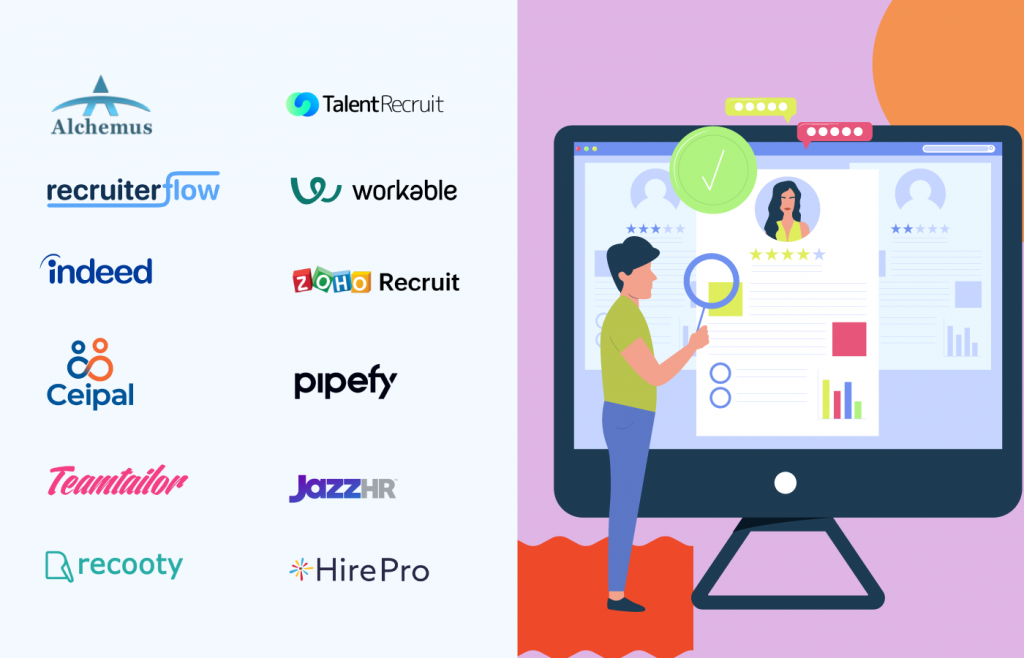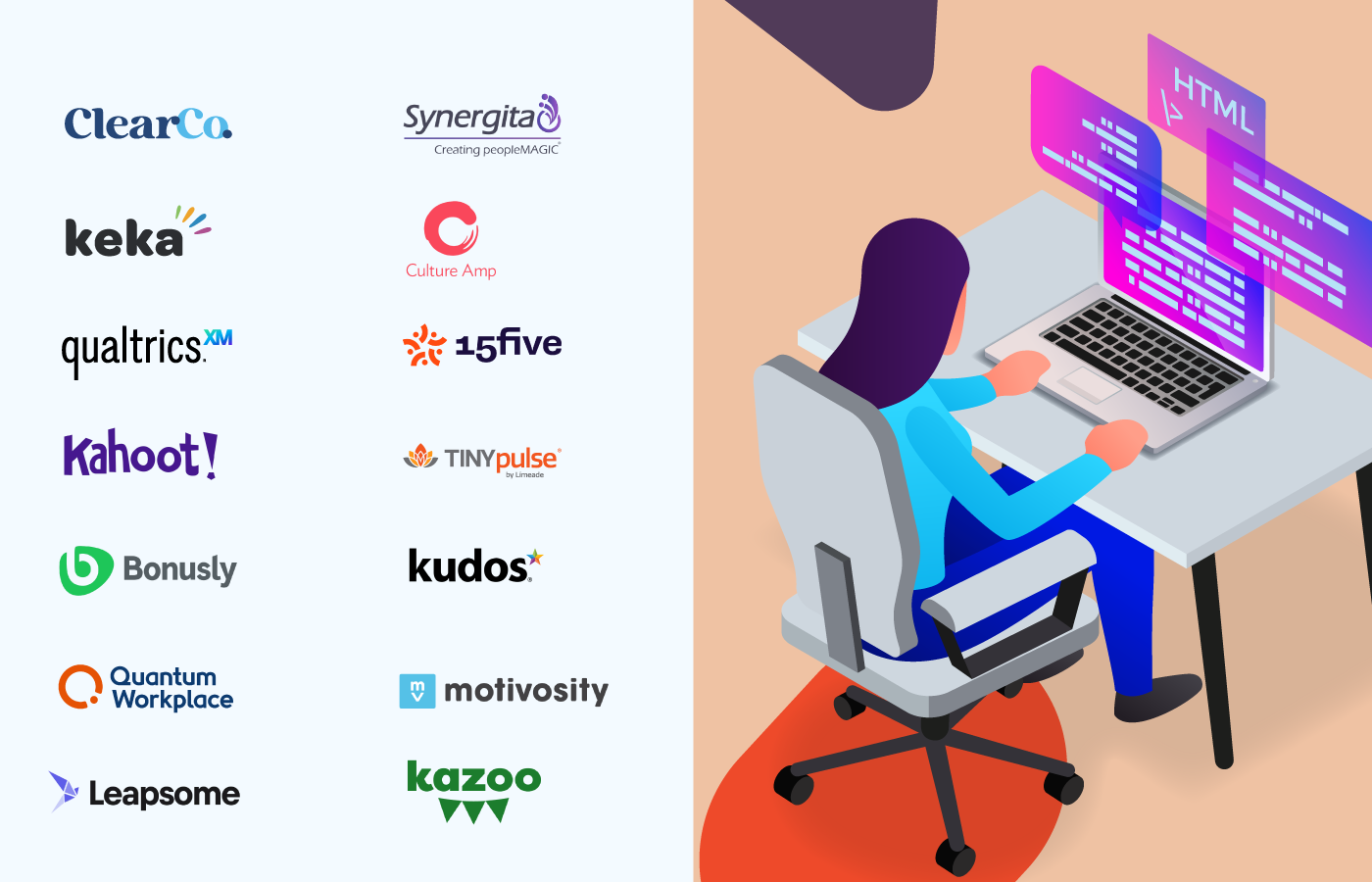Finding the right applicants for any job can be incredibly challenging, not to mention time-consuming. The best recruiting software relieves some of the headaches of the process by simplifying everything for HR teams, hiring managers and staffing agencies.
Want to leverage the power of AI for your recruitment efforts? Explore our insightful article on the best AI tools for recruiting that help you stay ahead in the competitive landscape of talent acquisition.
From sourcing an initial pool of candidates, through first-round screening, to eventually interviewing, recruitment platforms make it much easier to get you speaking to the most relevant, qualified people for each vacancy within your company.
1. What is Recruiting Software?
Recruiting software facilitates the hiring process, usually using a combination of sourcing, automation, communication, assessment, and analytics tools.
2. What are the Different Types of Recruitment Software?
Different recruiting software can have different focuses. Platforms like Ascendify and X0PA focus on developing machine learning and artificial intelligence to take up some of the burden of sourcing and screening applicants, while services like TestGorilla and Evalart focus on providing both pre-written and customized tests and questionnaires.
3. 27 Best Recruiter Software List
| Indeed | Best for leveraging one of the world’s largest recruitment sites |
| JazzHR | Best for SMBs looking to collaboratively make new hires |
| Pipefy | Best for building your own automated recruitment workflows |
| CEIPAL ATS | Best for increasing your pool of candidates through AI sourcing |
| Zoho Recruit | Best for multiple software integrations across business tools |
| Teamtailor | Best for a fully branded company career site to attract talent |
| Alchemus | Best for building a robust resume repository |
| SmartRecruiters | Best for high-volume recruiting |
| Evalart | Best for sending out tests to evaluate candidate skills |
| Workable | Best for an extensive library of recruitment resources |
| HirePro | Best for remote recruitment of college talent |
| FastTalent | Find and Hire Talent on Auto-Pilot |
| Recooty | Best for a streamlined approach to finding the right candidates |
| Recruiterflow | Best for recruiting agencies hiring for multiple clients |
| iCIMS | Best for an approachable user interface with high usability |
| TalentRecruit | Best for a platform that manages recruitment and onboarding in one |
| TestGorilla | Best for selecting candidates using data-driven assessments |
| Paycor | Best for recruiting software that integrates with a full HCM suite |
| X0PA AI Recruiter | Best for creating a more objective hiring process using RPA |
| BambooHR | Best for an app that enables mobile recruiting |
| Grove HR | Best for speeding up recruitment with automated pathways |
| ApplicantStack | Best for starting out on the road to digitizing the recruitment cycle |
| Breezy | Best for an easy-to-use system with core functionality and transparent pricing |
| PyjamaHR | Best for free-forever applicant tracking system |
| Paychecx Flex | Best for comprehensive support for HR tools utilization |
| Jobin.cloud | Best for integrating with LinkedIn for job sourcing |
| Kissflow Workflow | Best for businesses that want to build their own platform workflows |
4. Selection Criteria for the Best Recruiter Software
4.1 Recruitment software type
You might be looking for a pure applicant tracking system (ATS), which sources, organizes and tracks candidates throughout the hiring journey. You might want something that has the features of candidate relationship management (CRM), allowing you to create a repository of potential employees to draw upon in the future. Alternatively, there is some software that specifically focuses on a particular need, such as assessments and tests, virtual interviewing or job posting.
4.2 Company strength
How large is your company? Some platforms are designed to work solely with enterprises that have workforces in the thousands and constant hiring needs, while others are built for SMEs or startups that might have more infrequent usage of recruiting software.
4.3 Usability
Ensure you test the usability of a piece of software. The harder it is to grasp, the more time will be spent teaching staff to use it, and this needs to be weighed up against the depth of the offering (i.e., how many different capabilities it provides).
4.4 Vendor support
Level of support varies enormously, from very limited engagement beyond setup and pre-prepared guides, to 24/7 assistance. Some vendors will rely on bots to do the heavy lifting, while others only utilize call centers.
4.5 Price
There is never a conversation about purchasing the best recruiting software without any discussion on price. Consider the size of your company, the modules you’ll need and the level of support required in balance with what’s affordable for your business.
5. What are the Key Features of Recruiter Software?
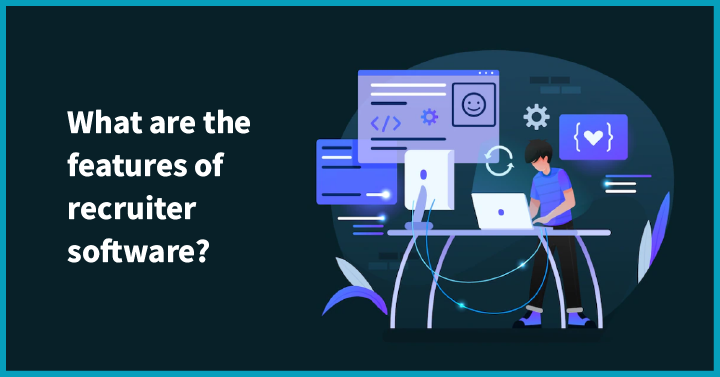
5.1 Automation of tasks
The most common feature that some of the best recruiting software offers is automation, including simultaneously posting roles to multiple channels and pre-screening of candidates using specified rules.
5.2 Integration of software
Integration can be inclusive or an extra cost; available for a vast array of programs (including job sites, social media and communication tools) or just the core HR platform.
5.3 Passive candidate management
Going beyond just the applicants approaching you to unearthing suitable individuals using passive candidate management is a task best left to AI if you want to save yourself a huge amount of time and energy.
5.4 User-friendly and intuitive interface
Some vendors make it their primary goal to create a unified interface that includes everything on a single pane of glass, others are more focused on creating a platform that allows you to easily switch between different windows and workflows.
5.5 Dashboard for recruitment analytics and reporting
Analytics pervades every aspect of IT. In recruitment, it can be used both to identify the best candidates for a role and to refine the hiring process using reports on sourcing efficacy and approval bottlenecks.
6. Overview of the Best Recruiter Software for Companies
6.1 Indeed – Best for leveraging one of the world’s largest recruitment sites
Best for: small, medium, and large size companies
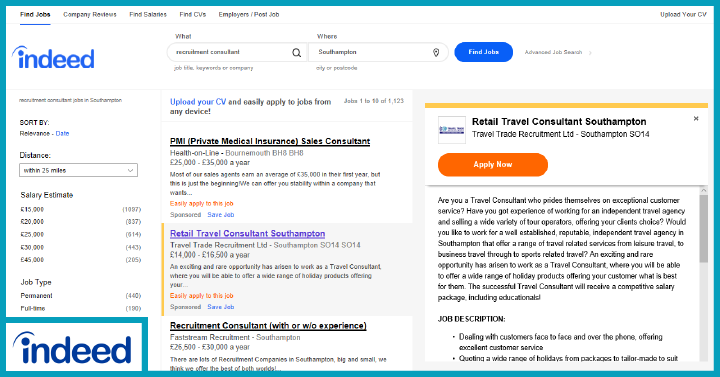
Indeed offers a suite of recruitment software tools designed to help employers streamline their hiring processes and attract top talent.
What makes it unique?
When you consider what is the most popular recruitment method, job sites tend to come up top, and Indeed is one of the most well-known on the market. The company has created a hiring platform that it claims can cut out 90% of manual effort and triple scheduled interviews by automating candidate screening according to your specified criteria. As the process progresses, companies can utilize a virtual interview solution with a digital waiting room, CV previews, and a note-taking function.
Indeed has also designed an extension to easily integrate with your existing ATS, so you can leverage the job site’s massive reach within your own hiring architecture.
Key Features:
- Job posting
- Resume Search
- Applicant Tracking
- Employer Branding
- Analytics
Pricing:
Prices are available on request.
Pros:
- Indeed's recruiter software is easy to use and navigate
- Employers can tailor their recruitment efforts to their specific needs and budgets
Cons:
- Lack of customer support
6.2 JazzHR – Best for SMBs looking to collaboratively make new hires
Best for: small and mid-sized companies
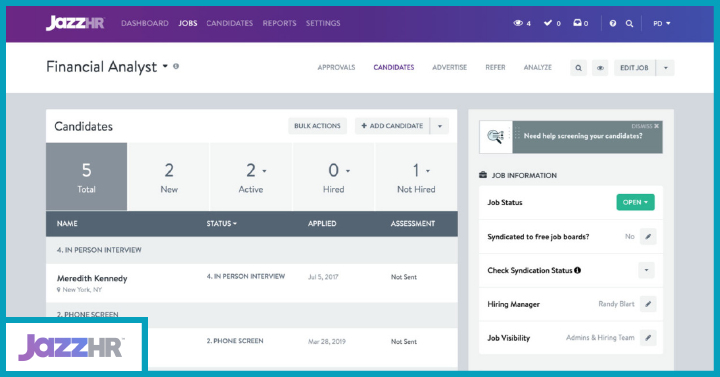
With JazzHR's recruitment software, you can easily attract, sort, handle, and collaborate with candidates alongside your hiring team, as it offers all the necessary tools.
What makes it unique?
JazzHR hopes to get you dancing for joy with its easy setup and highly customizable HR recruitment software.
Its platform can syndicate openings to multiple free and paid job boards per your requirements. Companies create customized workflows that update all relevant members about every hire for speedier, easier collaboration, including synchronized feedback and notes on applicant strengths and weaknesses.
Interview prep and assessment rating templates are available for use, and you can also opt to receive reports on your candidate sourcing routes, recruitment pipeline bottlenecks, and data on compliance with local laws to improve future efficiency.
Key Features:
- Sourcing and applicant tracking
- Interview Scheduling
- Collaborative Hiring
- Reporting and Analytics
Pricing:
Prices start at $39 per month for unlimited users with three open jobs ($9 per additional job posting), rising to $239 for unlimited open jobs, ATS, interviews, and assessments.
Pros:
- It is very intuitive and easy to use
- It does a great job parsing
- Makes onboarding very easy
Cons:
- It can be a bit overwhelming at first due to the range of features and customization options
6.3 Pipefy – Best for building your own automated recruitment workflows
Best for: small and mid-sized companies
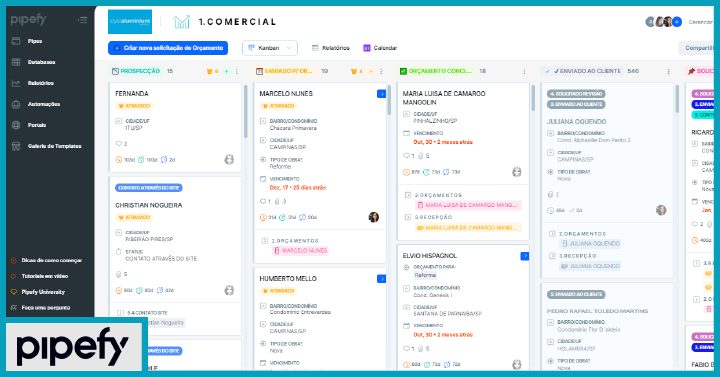
Pipefy enables the efficient management and optimization of process execution across departments, including tasks like analyzing contracts, managing bills, reporting incidents, and mitigating risks.
What makes it unique?
From IT operations to finance procedures, low-code automation flows naturally using Pipefy, a tool that allows companies to construct their own custom system with minimal fuss.
In recruiting terms, it can remove the necessity for emails and spreadsheets to keep track of applications, replacing them with a unified platform that provides full visibility of each step, from screenings to interviews, to sending offers. By introducing pre-programmed alerts, the application experience can be made more positive for both internal staff and external candidates.
Integrations with HRIS, CMS, and ERIS are all simple to build. Reports on time to fill and time to hire can also be extracted from the data.
Key Features:
- Customizable Workflows
- Automated Processes
- Collaboration and Communication
- Integration
- Analytics and Reporting
Pricing:
Prices start from $18 per user per month, though a free option is available for startups.
Pros:
- Pipefy has a mobile app that allows users to manage tasks and workflows on-the-go
- Pipefy provides detailed analytics and reporting
Cons:
- Pipefy may have a steep learning curve for users who are not familiar with process management software.
- Pipefy's pricing can be a disadvantage for some businesses, especially for smaller businesses or startups
6.4 CEIPAL ATS – Best for increasing your pool of candidates through AI sourcing
Best for: small and medium businesses
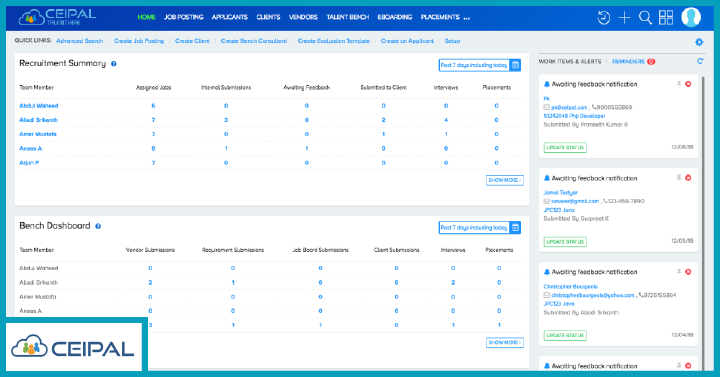
CEIPAL is a cloud-based recruitment software that helps streamline the recruiting process for staffing agencies, corporate HR departments, and recruitment teams. Founded in 2015, CEPIAL offers two principal platforms: workforce management and applicant tracking.
What makes it unique?
Its ATS can integrate with more than 50 job boards and automatically harvest relevant resumes, drawing upon a greater pool of talent using AI-driven sourcing that seeks out passive as well as active candidates to match the best people to the role. The platform provides weighted scores on categories such as experience, skills, personality and education so that you can directly compare applicants according to different criteria. In-built scheduling and video communication tools seamlessly progress an application to the next stage.
Key Features:
- Job posting
- Applicant tracking
- Resume parsing
- Candidate communication
- Interview scheduling
- Reporting and analytics
Pricing:
Prices start at $24 per user per month for the ATS, which can be purchased separately or with the workforce management solution.
Pros:
- It is easy to use and user friendly
- All the tools are very effective and easily accessible
- It helps you keep track of full-cycle recruitment
Cons:
- Sometimes, there is a delay in resume fetching
6.5 Zoho Recruit – Best for multiple software integrations across business tools
Best for: small to mid-sized businesses
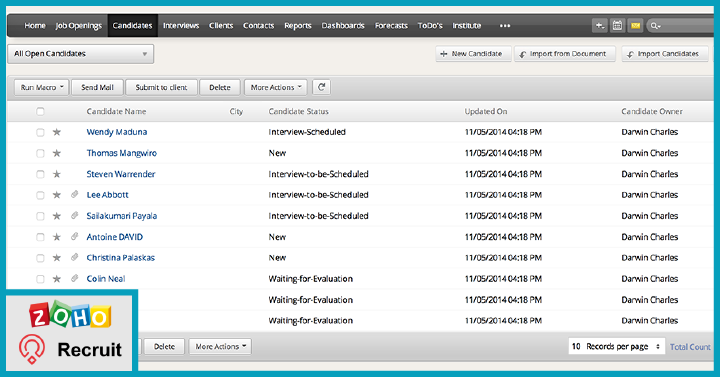
Zoho vends SaaS tools for various aspects of office work, including sales and marketing, IT, customer service and finance.
What makes it unique?
Its HR stable of apps includes Zoho Recruit, a piece of recruiting software that combines applicant tracking and candidate relationship management in a way that makes it ideal for both HR teams and staffing agencies. Jobs can be posted to more than 75 boards and instantly shared to social handles; the platform will then guide you through the hiring stages to make it easier to keep track of all pertinent applicants.
Candidates can be filtered by skills, location, and more, and you make doubly sure you only interview people who meet your criteria with pre-screening questionnaires and integrations with assessment platforms like HireSelect. In fact, integrations are one of Zoho’s specialities, with even the basic license package including the option to implement with Slack, Google Suite, Microsoft Outlook, and all common social media channels.
Key Features:
- Applicant tracking
- Candidate communication
- Interview scheduling
- Job posting
- Collaboration
- Reporting and analytics
Pricing:
Prices start from $20 per user per month, including 100 active jobs, premium job boards, and 50 integrations, though there is a free option for freelance recruiters.
Pros:
- Very simple user-interface
- Scaleable and ability to customize
- Works with multiple job boards
Cons:
- Pricing is high
- The mobile app has very limited functionality
6.6 Teamtailor – Best for a fully branded company career site to attract talent
Best for:small, mid-sized, and large businesses
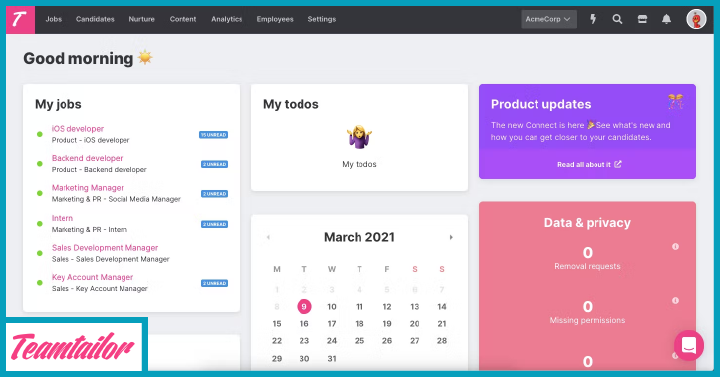
Working with more than 4,000 organizations, Teamtailor helps businesses attract candidates by working with them to build an attractive, informative career portal.
What makes it unique?
Their approach helps you present the essential details about your company and the positions available on a mobile-optimized website to make it as easy as possible for job seekers to absorb the key information, from browsing job specs to getting a feel for your business via testimonials from current employees. The drag-and-drop setup facilitates organizing your career site just how you want it, without the need for any in-depth technical skills.
Teamtailor's ATS functions include custom job application forms, review tools like tags and scorecards to rate candidates, and automated bulk message sending.
Key Features:
- Customized recruiting funnel
- Candidate Evaluations
- Background Screening
- Assessment Management
- Application Management
- Hiring Processes Tracking
Pricing:
Prices are available on request.
Pros:
- It's a quick-to-setup
- It has a very friendly UI recruit
- Fully customizable automation
Cons:
- It lacks capabilities in terms of candidate assessment
- It lacks features required by traditional agency recruiters
6.7 Alchemus – Best for building a robust resume repository
Best for: startups, small, and mid-sized businesses
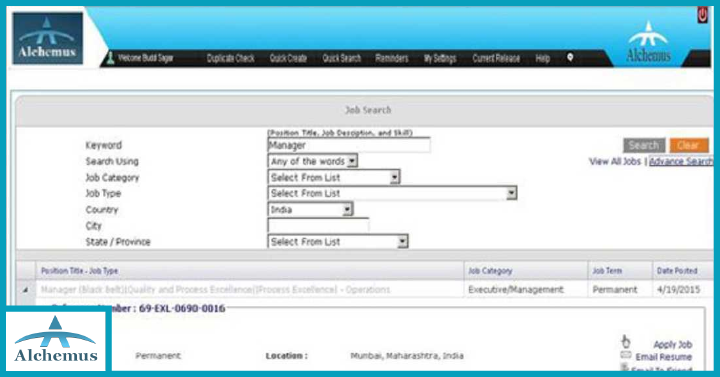
Boasting 20 years of experience in the talent acquisition and performance management field, Alchemus offers a number of HR solutions, including HCM and compliance policy oversight.
What makes it unique?
Its recruiting software can simultaneously distribute positions to job portals and social media, as well as helping to create a career site that slots into your existing company webpage. From there, the program can parse and filter resumes for key phrases and qualifications to rapidly whittle down the mound of applications.
Everything is cloud-based, including the resume repository, so as to increase data security and reduce the total cost of ownership for users.
Key Features:
- Business Intelligence and Analytics
- Vendor Management Portal
- Talent Acquisition
- Customer Relationship Management
- Contract Management
- Time & Expense Automation
Pricing:
Prices are available on request.
Pros:
- Good for tracking applicants and customer needs
- It provides a centralized database to store candidate information
Cons:
- It can be expensive compared to other recruiting software
- The user interface can be difficult to navigate or not intuitive
6.8 SmartRecruiters – Best for high-volume recruiting
Best for:small, mid-sized, and large companies
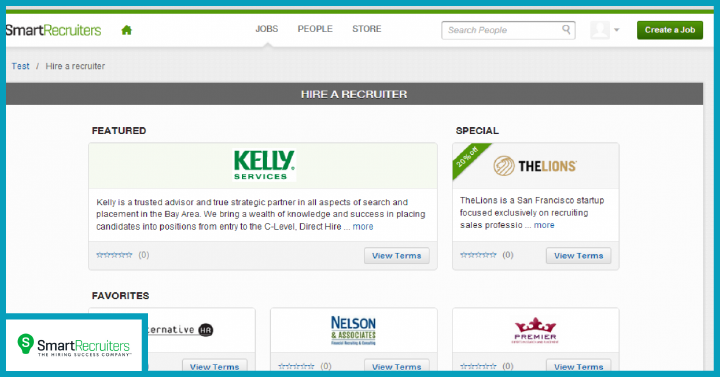
SmartRecruiters has worked with some of the world's largest companies, from Visa and Deloitte to Mcdonald's and Sodexo, to optimize their recruitment process.
What makes it unique?
The solution facilitates everything from expanding candidate sourcing to building custom career sites. It also has a system to help HR teams construct hiring campaigns featuring video content and employee testimonials, with associated stats so you can track the impact of your initiatives.
Integrated assessment tools ease the burden of screening and evaluating applicants at early stages, with templates and auto-replies pre-programmed to ensure the process is always moving forward, no matter how many people you’re assessing for a position.
Key Features:
- Candidate Sourcing Metrics
- Candidate Management
- Workflow Building
- Platform Functionality
- AI-Based Candidate Matching
- Automated Screening Assessments
Pricing:
Prices are available on request.
Pros:
- Easy to navigate and clean interface
- Knowledgeable customer service
- Can be deployed in multiple locations
Cons:
- Expensive compared to other tools
6.9 Evalart – Best for sending out tests to evaluate candidate skills
Best for: mid-sized and large businesses
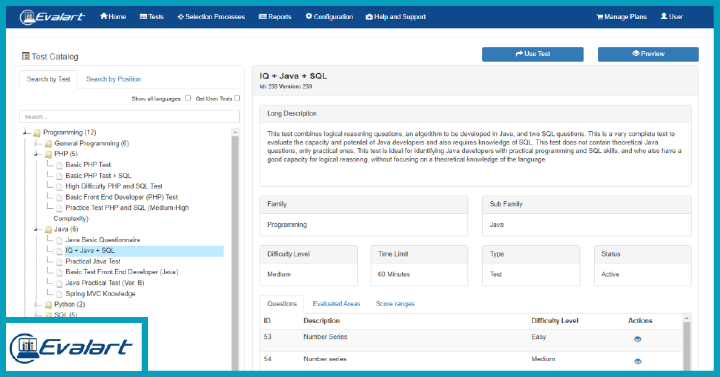
Evalart is a cloud-based talent assessment platform that offers various tools to help businesses and organizations streamline their recruitment and hiring processes.
What makes it unique?
As its name suggests, Evalart’s specialty is evaluation, promising to help filter out up to 80% of applications using either their pre-written tests or custom-made questionnaires specific to your company. While the bulk of their ready-made assessments center on programming tools such as Java and Python, as well as other IT knowledge, they also offer tests for project management skills, aptitude, and intelligence, as well as a limited number of languages. The results are then crafted into detailed but digestible reports.
Fraud detection and online proctoring services are available as part of the service to ensure you’re getting genuine results from qualified candidates.
Key Features:
- Online Tests & Psychometric Tests
- User Management
- Automatic Grading
- Assessment Management
- Candidate Management
- Candidate Comparison
Pricing:
Prices are available on request, though Evalart can be trialed for free for one month, including up to 15 evaluations.
Pros:
- It offers a wide range of customizable assessment tools
- Automatically screen and filter job applications
Cons:
- Evalart's customer support team is only available during business hours in Central Standard Time
- Evalart's pricing plans can be expensive for small businesses
6.10 Workable – Best for an extensive library of recruitment resources
Best for:small to mid-sized businesses
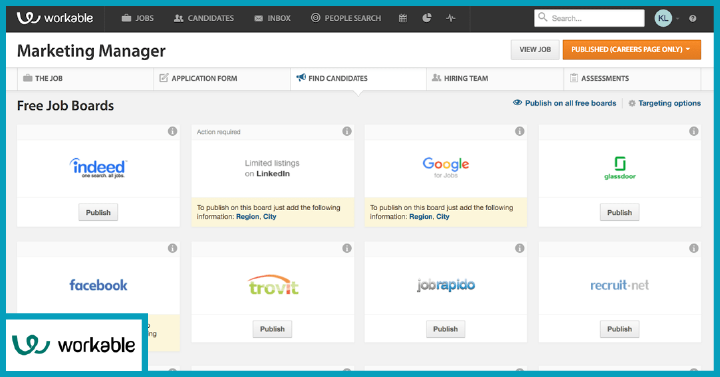
If you’re wondering what is the best recruitment software, Workable is definitely up there, having worked with more than 20,000 companies to sift through 85 million candidates to achieve 1.3 million hires.
What makes it unique?
The platform boasts one-click job sharing to more than 200 sites, built-in passive candidate sourcing, and AI-powered applicant recommendations. Once you’ve found the right people, you can reel them in with customizable career pages, mobile-friendly application forms, and streamlined interview scheduling, then pre-qualify them for interviews with skills assessments built right into the platform.
Workable has more than 1,000 hiring templates, including job descriptions, interview questions, and email frameworks, in addition to tutorials and regular blogs about how to deal with recruitment challenges.
Key Features:
- Candidate communication
- Interview scheduling
- Resume parsing
- Applicant tracking
- Job board posting
- Background checks and reference checks
Pricing:
Prices start from $129 per month for a pay-as-you-go license for occasional hiring, while the standard business packages cost $279 per month and include unlimited job postings.
Pros:
- It automates many of the manual recruitment processes
- Intuitive interface and dashboard
Cons:
- There is a steep learning curve to use the software
- Recruiters have limited control over candidate experience
6.11 HirePro – Best for remote recruitment of college talent
Best for:Mid-sized and large businesses
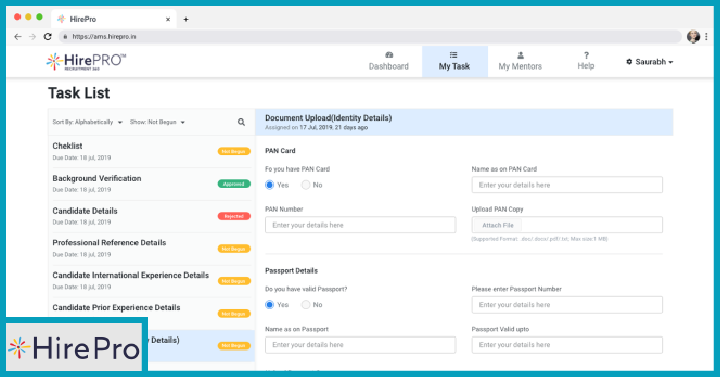
HirePro is a popular talent acquisition software that helps organizations streamline their recruitment processes. Since being founded in India in 2004, HirePro has carved out a niche for itself in the university sector, connecting freshly minted graduates with job opportunities.
What makes it unique?
Despite the age of the business, they’ve kept pace with the times and now offer an end-to-end virtual hiring process, from sourcing candidates, through assessments and interviews, to making an offer. HirePro’s recruiting software uses automated workflows to speed up the process of finding the right candidates, with an array of tests available to examine coding skills, aptitude and behavior type through video, multiple choice and other formats.
HirePro will also facilitate interviews by providing logistical support and data-driven reports on top candidates, as well as supplying expert interviewers so you don’t have to worry about anything at all.
Key Features:
- Applicant Tracking System (ATS)
- Campus Recruitment Automation
- Interview Scheduling
- Onboarding
- Recruitment Analytics:
Pricing:
Prices are available on request.
Pros:
- Offers customizable workflows
- Easy integration with third-party ob portals
Cons:
- HirePro can be expensive for small businesses
- Slow response time to customer issues
6.12 FastTalent - Find and Hire Talent on Auto-Pilot
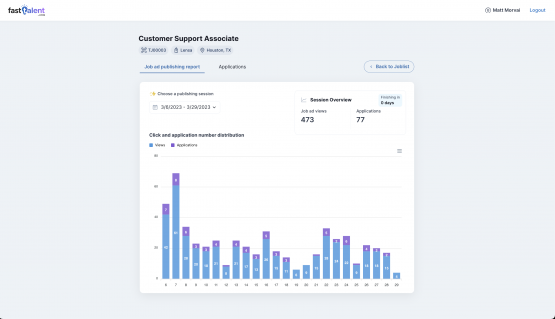
Fast Talenet is an innovative recruitment software that allows employers to instantly promote their job openings to millions of job seekers across the United States. It is a full e-commerce solution launched through Lensa, a job search engine that helps millions of job seekers find the right talent through its advanced match-making system. Users can promote their jobs to Lensa's 17+ million members through email, SMS, and site outreach using our performance-based advertising with configurable job-level bids
Pros:
- Streamlined recruitment processes with ease
- Flat monthly or annual pricing for advertising all jobs on Lensa
- Generates reports to track applications and find suitable candidates
- Ease to use and seamless integration with recruitment plans
- Advanced algorithms and analytics for talent match-making and tracking relevant job seekers
- Affordable and competitive pricing
- Demographic and skill-based optimization for searching for the best candidate
- Flat monthly or annual pricing for advertising white and blue-collar jobs
- Generates reports to track candidates
Cons:
- Limited availability to the US only.
- Pricing is not disclosed on the website.
6.13 Recooty – Best for a streamlined approach to finding the right candidates
Best for:small to mid-sized businesses
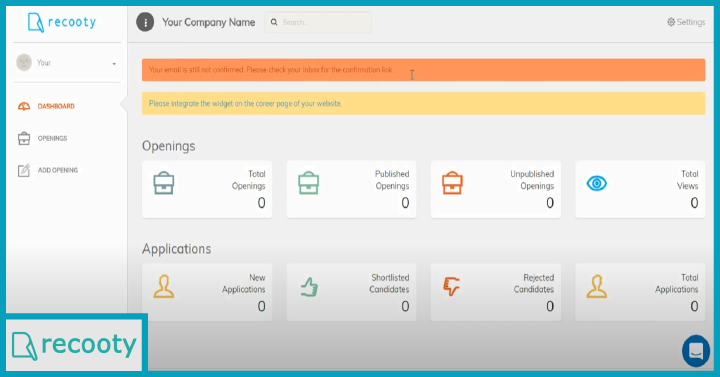
Recooty is a cloud-based recruitment software that helps companies manage their recruitment process efficiently. Tech research and consulting firm Gartner rated Recooty the number-one recruiting software in 2022.
What makes it unique?
Its interface provides clear visualization of all candidates, so you and other relevant stakeholders can readily review, shortlist, and interview applicants at the click of a mouse. Searches can be prioritized based on specific skills, with an assessment follow-up to ensure the individual can do what they claim, as well as a smooth interview scheduling feature.
Job postings are syndicated to popular job boards, social media, and your company’s custom-built careers page, with 24/7 customer service available should you encounter any issues.
Key Features:
- Candidate Screening
- Talent Pool
- Collaboration
- Customizable career page
- Analytics
- Applicant Tracking System (ATS)
Pricing:
Prices start at $49 per month, including 10 active job posts, 10 company users, and a branded careers page.
Pros:
- Recooty is easy to use and requires no technical knowledge
- The software is affordable and comes with a free trial
Cons:
- Recooty has limited integration with other HR software and platforms
- Recooty does not have AI-based features such as chatbots or predictive analytics
6.14 Recruiterflow – Best for recruiting agencies hiring for multiple clients
Best for:Large companies
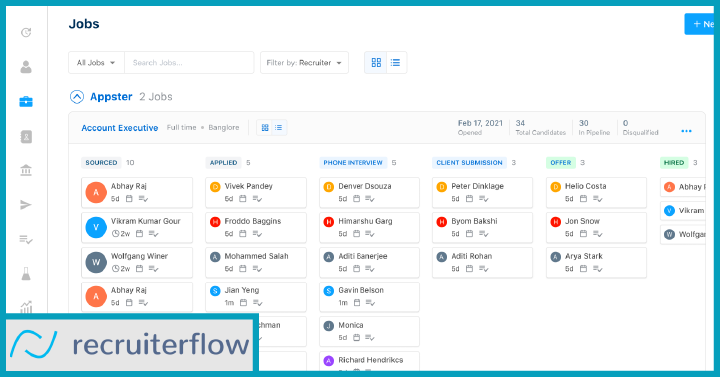
Recruiterflow is a cloud-based recruiting software that provides end-to-end recruitment management solutions. When it comes to finding what is the most popular recruitment agency software, Recruiterflow is definitely in contention.
What makes it unique?
Where a lot of the recruiting software on this list is designed for in-company use, Recruiterflow squarely targets agencies with its full suite of products. The CRM’s drag-and-drop interface makes it simple to organize candidates for the various jobs you are trying to fill. Source relevant individuals through job posts and personnel databases, with a resume parsing functionality to pick out the key skills and experiences your clients want.
Communication can then get rolling with automated email sequences designed to pique the interest of passive candidates, with triggers and alerts built in along the way to remove the manual element to common hiring checklist items. The entire process can be tracked and evaluated through Recruiterflow's data dashboard, which assesses KPIs and collects raw data on the recruiters in your team so you can see who is performing well.
Key Features:
- Candidate sourcing
- Applicant tracking system
- Resume parsing
- Interview scheduling
- Automated email campaigns
Pricing:
Prices start from $99 per user per month for small teams of up to 3 people.
Pros:
- Recruiters can automate many of the repetitive and time-consuming tasks
- Enables multiple recruiters and hiring managers to collaborate on the recruitment process
Cons:
- It has a wide range of features, which can be overwhelming for some users
- It is a relatively expensive solution
6.15 iCIMS – Best for an approachable user interface with high usability
Best for: Medium and large enterprises
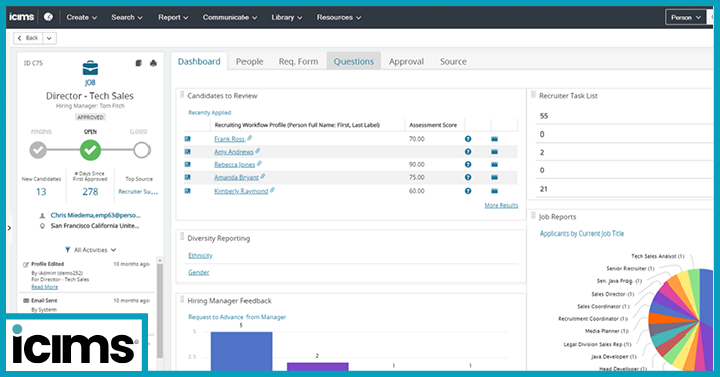
iCIMS is an enterprise-level applicant tracking system (ATS) that helps organizations manage their hiring processes. iCIMS Talent Cloud combines an application tracking system core with supporting functions like a messaging service and an analytics dashboard.
What makes it unique?
The platform uses AI to speed along the sourcing and screening processes while also helping to present a positive brand image through custom career sites and efficient candidate relationship management, and timely applicant communication.
Recruiting analytics helps you not only track open positions, source of hire, cost per hire, and time to fill but also strengthen diversity, equality, and inclusion policies.
Key Features:
- Candidate sourcing
- Customizable workflows
- Robust reporting and analytics
- Comprehensive onboarding
- Team collaboration
Pricing:
Prices are available on request.
Pros:
- It can handle high volumes of applicants and users
- The software is highly customizable
Cons:
- It is a relatively expensive recruiting software
- The interface can be overwhelming and difficult to navigate for new users
6.16 TalentRecruit – Best for a platform that manages recruitment and onboarding in one
Best for:mid-sized and large businesses
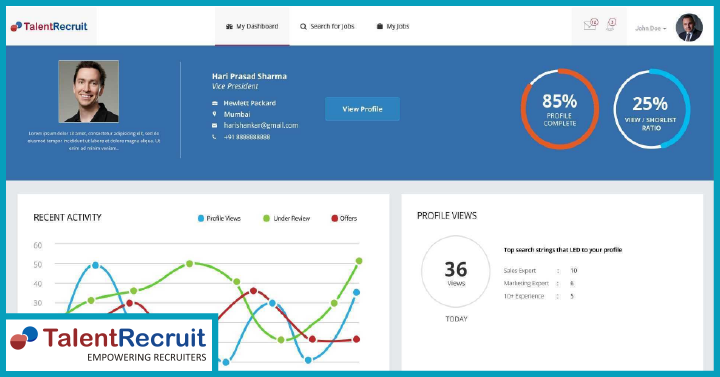
TalentRecruit offers recruiting software for corporate entities and staffing agencies, following it up with an onboarding solution to facilitate the adoption of new hires.
What makes it unique?
The platform’s match-making machine automatically ranks candidates based on suitability for a role. Robotic recruiter ERIKA keeps candidates engaged while simultaneously managing data points on them and funneling appropriate individuals down the pipeline. Bespoke employer branding can be deployed on candidate career portals with eye-catching video content to attract top-tier talent.
TalentRecruit’s hiring manager portal is the hub from where all applications can be managed via a single screen, which contains notifications, pending tasks and the capability to roll out offers. A separate assessment module can be added to test qualifications and skills.
Key Features:
- Applicant Tracking System
- Referral Management
- Compliance and Security
- Talent Analytics
- Resume Parsing
- Team Collaboration
Pricing:
Prices are available on request.
Pros:
- Easy to use and navigate
- It can provide a better candidate experience
Cons:
- It can be complex and require a learning curve
- It can be expensive to purchase and maintain
6.17 TestGorilla – Best for selecting candidates using data-driven assessments
Best for:small to mid-sized businesses
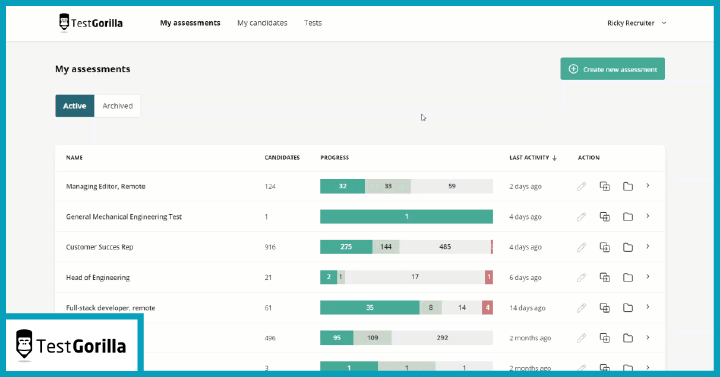
Rather than CVs and interviews, TestGorilla encourages companies to focus on assessments.
What makes it unique?
More than 238 scientifically validated tests are available in its library, from those that focus on hard skills like data management and creating RESTful APIs, to those that center on personality types and critical thinking. There is even a test that allows you to divine how well a candidate’s expectations align with the role using Oldham and Hackman’s Job Characteristics Model.
Applications are ranked by TestGorilla according to how well applicants perform in your selected assessments, enabling data-driven decisions that remove unconscious bias from the equation.
Key Features:
- Customizable tests
- Wide range of tests
- Pre-employment screening
- Candidate management
- Third-party integrations
Pricing:
Prices start from $25 a month for the pay-as-you-go plan, though there is also a free trial plan and a more expansive plan for $300 per month that includes more assessment and candidate credits to spend on job hires.
Pros:
- It offers comprehensive testing
- Can create customizable tests
- easy to use and navigate
Cons:
- Pricing is not publicly available
- The free trial only allows for one test to be taken
- It currently supports only English
6.18 Paycor – Best for recruiting software that integrates with a full HCM suite
Best for: startups, small to mid-sized businesses
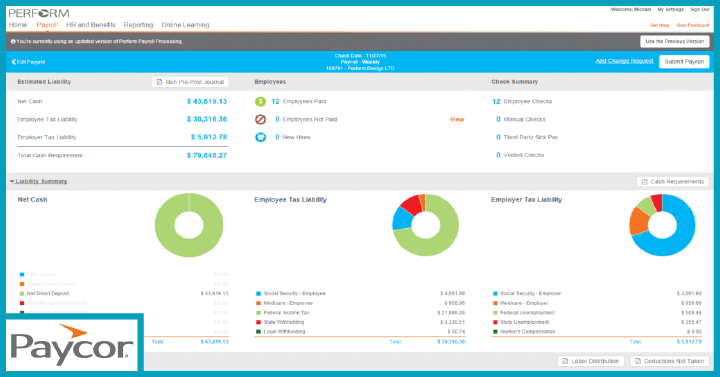
Paycor provides a range of HR solutions, including payroll, workforce management and benefits administration.
What makes it unique?
Paycor is a cloud-based payroll and human resources software that provides a range of features for businesses of all sizes. Its recruiting software is designed for mobile access – both for hiring managers and applicants – and features automatic job postings to Indeed, LinkedIn, Glassdoor and ZipRecruiter, the capability to build a careers site, an employee referral rewards system, and analytics to track time to hire and lead sources.
Whitepapers and webinars cover the gamut of HR challenges, with topics such as how to integrate diversity into the workplace.
Key Features:
- Payroll processing
- HR management
- Reporting and analytics
Pricing:
Prices for the Paycor package that includes talent management start from $199 per employee per month.
Pros:
- Paycor has a user-friendly interface
- It offers a range of customizable features
- It provides excellent customer support
Cons:
- Limitations in the customization
- It can be more expensive than some other payroll
6.19 X0PA AI Recruiter – Best for creating a more objective hiring process using RPA
Best for: mid-sized and large businesses
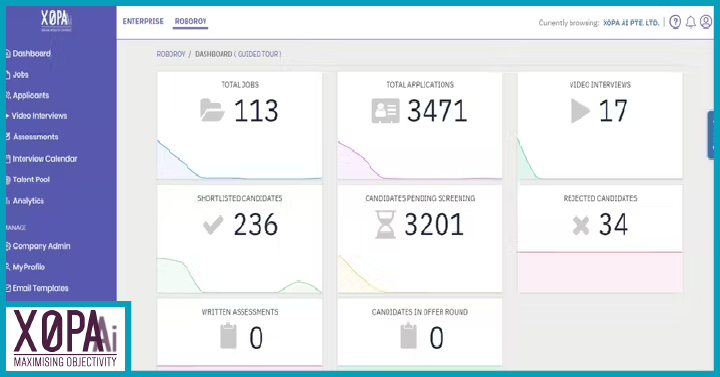
X0PA AI offers hiring solutions for enterprises, SMEs, government and academia.
What makes it unique?
The Recruiter program is a piece of SaaS software that uses artificial intelligence to source and assess talent, using X0PA’s patented algorithms to find the best fit for your company and the role you are looking to fill.
Robotic process automation (RPA) reduces manual tasks to enable scaling of the recruiting process, simultaneously removing elements of human error and creating a more objective hiring process. X0PA’s platform aims to predict both candidate performance and retention based on analytics and natural language processing.
Key Features:
- Resume screening
- Candidate matching
- Candidate engagement
- Interview scheduling
- Predictive analytics
Pricing:
Prices are available on request.
Pros:
- It automates many time-consuming tasks
- It uses chatbots and other tools to keep candidates engaged
- It uses predictive analytics
Cons:
- Because of high pricing, it may not be feasible for smaller companies
6.20 BambooHR – Best for an app that enables mobile recruiting
Best for:mid-sized and large businesses
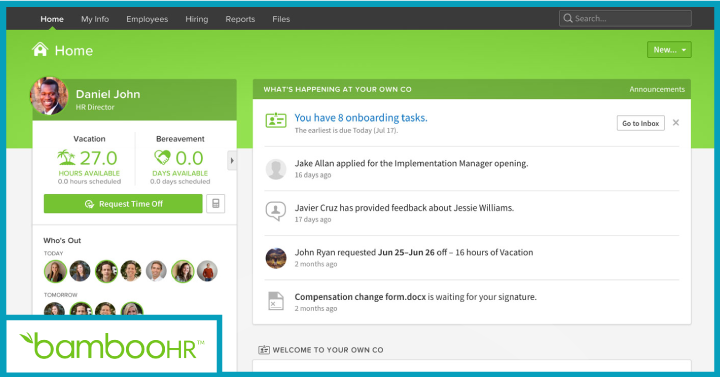
Providing products that address the entire employee life cycle, from hiring to employee wellbeing, BambooHR is one of the most commonly seen HR tools on the market.
What makes it unique?
Its recruitment solution aims to keep the process organized, with timely communication to keep candidates engaged and a collaborative interface so that all internal stakeholders can stay up to date. Openings can be posted on job sites and social media with just a few clicks, and reports are available to help identify hiring bottlenecks and measure time to hire.
The entire ATS system is also available as a sleek modern app, so HR teams can stay on top of applications whether they’re in the office or on the go.
Key Features:
- Applicant Tracking
- Onboarding & recruitment
- Performance Management
- HR Reporting
- Employee Time Tracking
- Employee Self-Service
Pricing:
Prices are available on request.
Pros:
- It has an intuitive interface
- It is highly customizable
- It integrates with many other software systems
Cons:
- It can be expensive, especially for small businesses
- It offers reporting capabilities
- It may not provide an advanced level of analytics
6.21 Grove HR – Best for speeding up recruitment with automated pathways
Best for:small, medium and large businesses
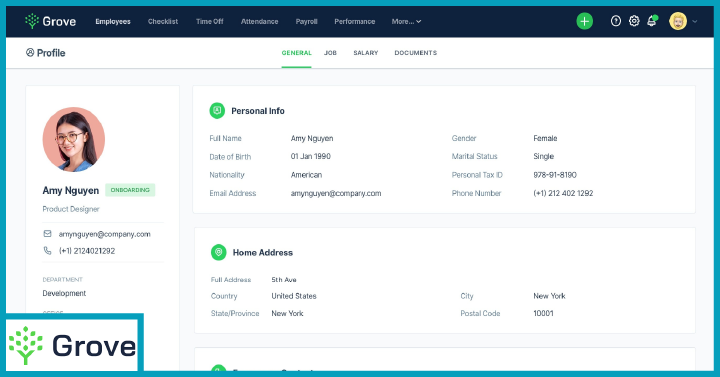
Grove supplies onboarding, employee management and performance enablement tools, among other HR solutions.
What makes it unique?
According to the company’s website, 70% of candidates lose interest if the hiring process is slow, which is why Grove has focused on speeding up communications, interviews and offers using automation. The interface allows you to discuss applications with colleagues via a notes function, while also enabling you to tag potential employee profiles with particular skills to make it easier to categorize and find them later.
Grove also offers simple job posting and branded career page services.
Key Features:
- Onboarding management
- Performance Management
- Time and Attendance
- Benefits Administration
- Payroll Processing
- Employee Self-Service
- Reporting
Pricing:
Prices start from $3 per employee per month for the basic HR tech stack, including recruitment alongside tools like core HR, time off and attendance tracking, and remote onboarding.
Pros:
- It is very user-friendly
- It is an all-in-one solution that includes all the HR tools
- It can scale to meet the needs of small, medium, and large businesses
Cons:
- It is not customizable enough to meet the specific needs of some businesses
- It has limited integrations with other software systems
6.22 ApplicantStack – Best for starting out on the road to digitizing the recruitment cycle
Best for:startups, small, mid-sized, and large businesses
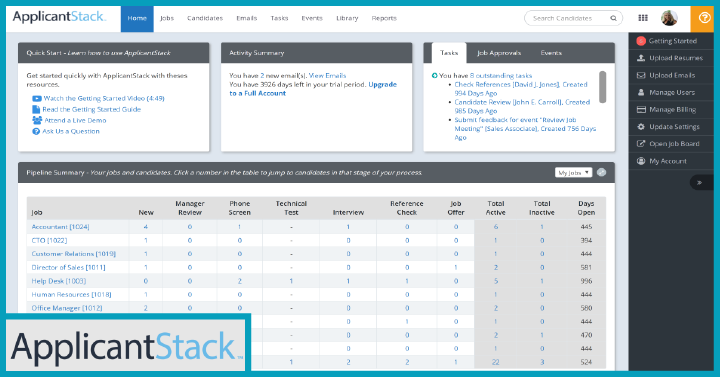
Specializing in recruiting and onboarding, ApplicantStack is part of Swipeclock’s suite of HR services and has worked to whittle down more than 22 million candidates for 430,000 jobs.
What makes it unique?
The solution takes you through job spec creation (including ready-made templates) and posting to custom-built job boards (white labeled for your company), onto screening (via questionnaires and keyword parsing) and applicant ranking (using a set of parameters you create), before finishing up with automating the offer process.
ApplicantStack also features collaboration tools for recruitment teams, reporting features to analyze the secret to successful hires and interview scheduling.
Key Features:
- Job Posting
- Applicant Tracking
- Resume Parsing
- Team collaboration
- Reporting and Analytics
Pricing:
Prices start from $99 per month for the Recruit platform, though this can be bundled with the Onboard platform for $144.
Pros:
- It provides real-time updates on the status of job postings
- It offers a comprehensive suite of features
Cons:
- It may be overwhelming for small teams or companies that don't receive a high volume of applicants
- It may not always accurately parse resumes
- It is challenging to coordinate multiple team members' schedules
6.23 Breezy – Best for an easy-to-use system with core functionality and transparent pricing
Best for:small to mid-sized businesses
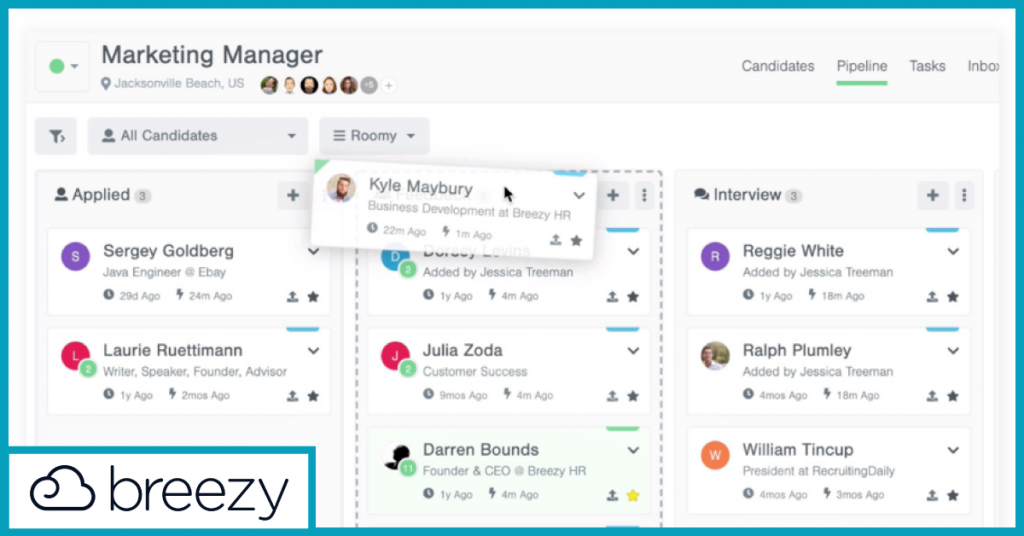
Based out of Florida, USA, but working in 83 countries, Breezy breaks recruitment down into three key areas: attract, qualify and hire.
What makes it unique?
After posting roles to more than 50 jobs sites and building a career page, Brezzy then takes users through a qualifying process via automated pre-screening and a drag-and-drop interface to pick out the most promising applicants, before making interviews easier with guides, native video communication and scheduling software.
Finally, you can streamline hiring with custom offer templates, followed by some time spent with the data dashboard discovering how to further optimize the workflows.
Key Features:
- Applicant tracking system (ATS)
- Job posting and distribution
- Customizable hiring workflows
- Email templates
- Interview scheduling and feedback collection
- Reporting and analytics for recruitment metrics
Pricing:
Prices start for $143 per month with unlimited users, candidates, open positions and pools of people who may be useful for future roles.
Pros:
- Easy to use and intuitive interface
- Integrations with other HR and recruiting tools
- Mobile app for on-the-go recruiting
- Affordable pricing options for small and medium-sized businesses
Cons:
- Limited customization options for some features
- Not suitable for very large or complex recruiting needs
6.24 PyjamaHR – Best for free-forever applicant tracking system
Best for:small to mid-sized businesses
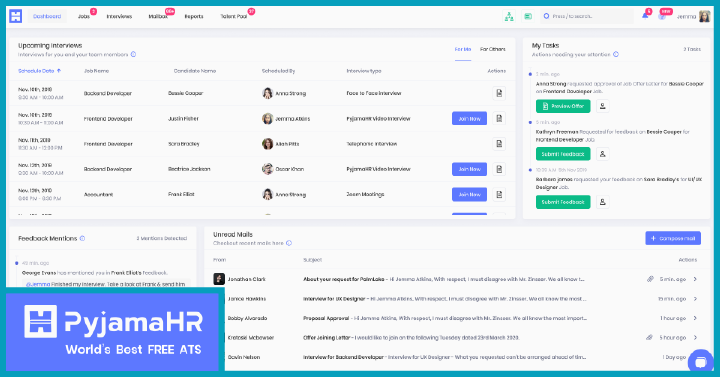
PyjamaHR is a recruitment software designed to streamline the hiring process for businesses. Founded in 2021, PyjamaHR offers all the core features of an applicant tracking system.
What makes it unique?
Publish jobs to partner sites or your own career page, filter through applicants using specific keywords and skills, keep communications neat and tidy, and easily schedule interviews through the easy-to-use dashboard.
All information on candidates is stored for future reference in an easily accessible database as part of the interface.
Key Features:
- Applicant tracking system (ATS)
- Job posting to multiple job boards
- Customizable career page
- Resume parsing and keyword search
- Interview scheduling and feedback
- Candidate communication and email templates
- Reporting and analytics
Pricing:
PyjamaHR’s ATS is free to use.
Pros:
- Easy to use interface
- Customizable and branded career page
- Integration with multiple job boards
Cons:
- Limited integrations with other HR software
- No social media job posting
- Limited customization options for email templates
6.25 Paychecx Flex – Best for comprehensive support for HR tools utilization
Best for:small to mid-sized businesses
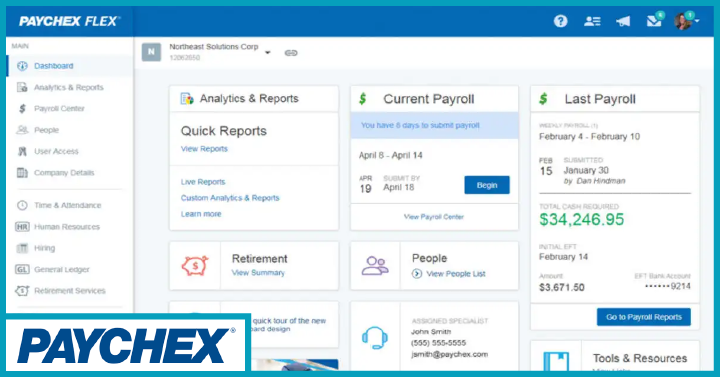
Paychex supplies more than 730,000 with HR tools, such as payroll and benefits management, all in one platform.
What makes it unique?
The Paychex Flex hiring solution includes employee screening and background checks, an applicant tracking system where all candidate information is centralized, and the ability to standardize company processes, from posting roles to job sites via integrations to scheduling interviews.
Paychex offers 24/7 support as well as a team of advisors to help customers get the most out of their products.
Key Features:
- Customizable job postings and online applications
- Candidate screening and filtering tools
- Automated email communication with candidates
- Interview scheduling and tracking
- Analytics and reporting on recruiting metrics
Pricing:
Prices are available on request.
Pros:
- Mobile app allows recruiters to manage hiring on-the-go
- Customizable workflows and approval processes to match the unique needs of your business
- Robust analytics and reporting features to help you track your recruiting success
Cons:
- Limited functionality compared to standalone applicant tracking systems (ATS)
- Less customization options compared to some other recruiting software
- Pricing may be higher than some smaller businesses can afford
6.26 Jobin.cloud – Best for integrating with LinkedIn for job sourcing
Best for:small, mid-sized, and large businesses
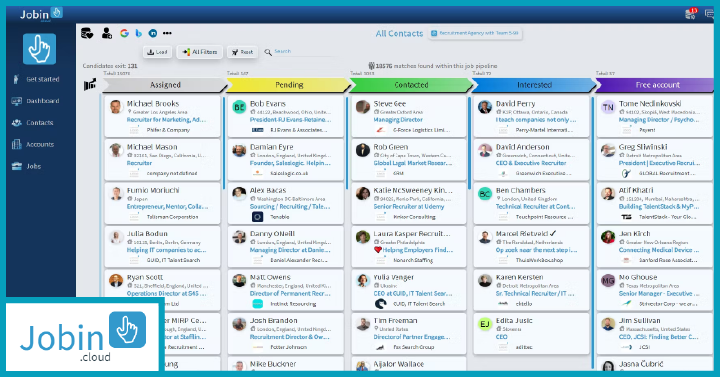
Jobin has been primarily designed as a way to harness the world’s largest professional social app, LinkedIn.
What makes it unique?
Automated LinkedIn importing instantly harvests skill summaries, professional experiences, and contact details from people of interest with a single click, using a web browser extension to transfer the information to your platform. Jobin also has its own ATS, filters and ranks applicants according to your parameters, as well as providing messaging services with templates for contacting potential hires.
There’s also the option to have Jobin get more hands-on with the data, sourcing, and enriching information that’s not readily accessible via LinkedIn.
Key Features:
- Candidate sourcing
- Applicant tracking
- Automated communications
- Data Analytics
Pricing:
Prices start from $8.99 per month for solely the LinkedIn automation features, while the ATS and the sourcing and enrichment module each cost an additional $19.99. Limited usage can also be obtained for free, including 1 job opening and 100 bulk emails per day.
Pros:
- It is user-friendly and intuitive, with a clean and modern interface
- It is relatively affordable compared to other recruiting software
Cons:
- It has limited integrations with other software platforms
- Customer support is slow to respond to issues
6.27 Kissflow Workflow – Best for businesses that want to build their own platform workflows
Best for:small to mid-sized businesses
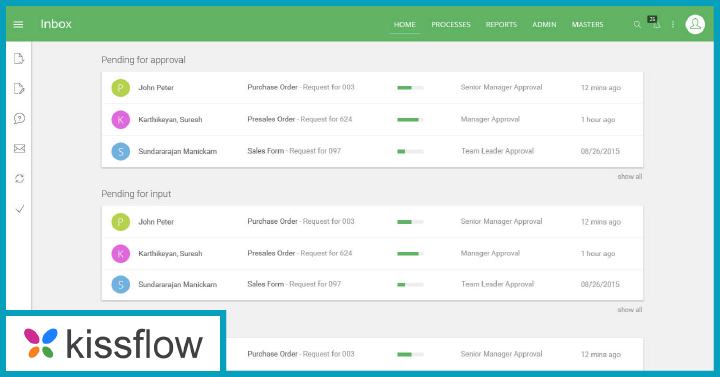
Providing no-code and low-code solutions for all manner of workflows since 2012, Kissflow helps you to build your own applications, project management tools and integrations.
What makes it unique?
As part of its solutions, it offers a free template for you to construct your own recruitment pathways, which can be deployed in minutes. This includes customizing your hiring, interview, and onboarding workflows, streamlining candidate interactions, and building a dashboard for analytics of the entire process.
Everything is completely customizable and accessible via the cloud.
Key Features:
- Applicant tracking system (ATS)
- Automated interview scheduling
- Candidate scoring and evaluation
- Customizable workflows
- Reporting and analytics
- Integration with job boards
Pricing:
Prices start at $10 per user per month for 50 users minimum.
Pros:
- User-friendly interface and easy to navigate
- Highly customizable to fit the needs of different organizations and recruiting processes
- Scalable for organizations of different sizes and recruitment needs
- Affordable pricing plans for different business sizes
Cons:
- Limited customization options for some features
- Lacks some advanced recruitment features
- Limited customization options for the mobile app
7. FAQs
- What are some free recruitment software?
There are a number of companies that offer limited services for free to small startups or freelance recruiters, including such popular services as Zoho Recruit.
- What are some online recruitment software?
Most of the options available in the market today are online and even mobile optimized. At the very least, companies will have the option to create a hybrid solution of on-premise and cloud.
- What are some cloud-based recruitment software?
In order to increase data security, reduce total cost of ownership and improve accessibility, it’s fairly common to see cloud-based recruitment software these days, including iCIMS, CEIPAL and Alchemus.
 Interested in Virtual Team Building Events?
Interested in Virtual Team Building Events?



